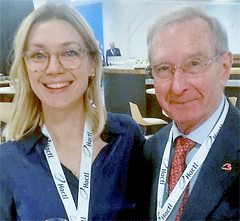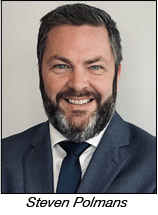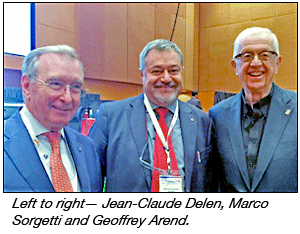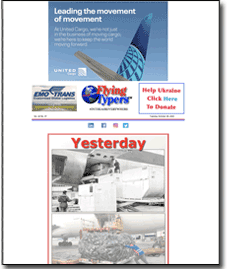

#INTHEAIREVERYWHERE
| |
 |
 #INTHEAIREVERYWHERE |
| Vol. 22 No. 40 | Tuesday
November 7,
2023 |
| |
Delen To TIACA Hall Of Fame |
In 1980 many of our readers were younger, and today’s young ones had yet to come to life. Our generation was surely in full bloom, at least I was 28, with two big eyes, thick glasses and a voracious curiosity. The world around us was producing images, music and emotions in volumes and at a speed we could barely keep pace with. John Lennon was about to be killed and that closed a period in music that can hardly be repeated. In fact I am writing on the very day when the last Beatles’ song has been launched: Now and Then is a beautiful song, enchantingly sad. Moving away from sadness, 1980 also brought other remarkable events, one of which, in my view, fit with the story and interview that I am proposing today. On May 12th 1980 the premiere of FAME took place. As many other music lovers I ran to the theatre to watch. Despite some critics being unimpressed by the stories, the live performances, the music and the acrobatic dancing were so eye-catching that I came home elated and happy and I felt as though my life had been taken by hand to a new dimension. So the word fame will always mean to me something that has to do with exploding talent and captivating music, which by the way did get an academy award, together with hard study and success against all odds. In 1980 one of my colleagues and friends, actually one of FlyingTypers’ friends too, Jean-Claude Delen, was starting to form his own building blocks towards fame. We shall hear in the following interview that he recalls his work in the eighties as the foundation for the recognition he will be bestowed this evening at the TIACA summit in Brussels. Jean-Claude’s life has been a continuous exercise to achieve perfection, not in singing or dancing, but in the “keep your customer satisfied” art. And he did so with grace and enthusiasm, as the singers and dancers in the film do. In 2023 TIACA has decided for Jean-Claude to be the new inductee into the Hall of Fame for this year. This is the tantamount unique coronation of Jean-Claude’s speckles and meaningful career in logistics, which I shall try to examine with the inductee himself in the following interview. FT: Jean-Claude, you have been inducted into TIACA’s Hall of Fame this year. This is a recognition to your priceless contribution in the development of Air Cargo. Can you tell us the first single action you have taken that you consider most meaningful in this regard? JCD: In my view the most meaningful action was setting up a really professional institute in Brussels to represent air cargo interests from the forwarders’ side, BAFI. This was the first real community getting together for achieving better cargo business. I was at AEI then, not the biggest operator in Brussels. I worked and worked, and then we became number one, and this was done within the framework of the peer cooperation that BAFI was providing. Efficient and best-designed service to your customers was what mattered in the early eighties. As my second best achievement I would count my approach to customers, which was emulated by many colleagues: in front of my customers there was just a white piece of paper and my question: “please tell me what you need from me.” Internationally my work started with CLECAT and then FIATA, I was always very close to the airfreight institute of FIATA (AFI). FT: This is the second time that a FIATA Past President makes it into TIACA’s Hall of Fame, after Issa Baluch. Do you believe this marks a period where collaboration between FIATA and TIACA could develop into something more meaningful than mere courtesy? JCD: I am humbled and very honoured to follow a great professional like Issa. If I understand well what you mean by “something more meaningful”, I think we missed the boat sailing at the time when GACAG was created, but all went over the edge at one point. In my view we came to the time when some duplication was becoming perceptible and there seemed to be little interest left in IATA to push this forward. TIACA and FIATA were left with a creature that was in the end nobody’s child and had failed to write its own destiny. This is an endeavour that cannot be resurrected today, but I see no reasons for TIACA and FIATA to not cooperate on certain issues, digitization being one of evergreens. FT: Jean-Claude, I am not sure how sympathetic you would be to this, but If they wish to rise to the daring challenge they could discuss payments and settlements through an innovative platform such as PayCargo. That could become a strong message, if there is a will to put the issue on the table. JCD: Well, that could be a strong message for sure, maybe we need somebody who is able to articulate this question. There are much greater capabilities with today’s technology, this surely did not exist in the eighties . . .
FT: We know you were very happy with the Brussels FIATA Congress in October and we have expectations for a good meeting again in November under the aegis of TIACA. Is Brussels getting front stage more often now because of the recent work done by the local community or is this an almost belated recognition for many years’ work? JCD: Surely this is the recognition for what has been done in many years. In 2014 Brussels was handling some 250,000 tons and now it is past 700,000: there has been a big effort made by the entire community and the airport structure. The FIATA congress was a big success: I believe FIATA delegates expressed that the official part starting on Oct 3rd was really good, even more than the usual Institute and Advisory Body work. Of course that is how FIATA exists, but an appealing debate with good speakers and fresh information on stage is surely what created the success of this gathering. FT: Brussels Airport has put together the Brucloud, which was hailed by our friend Brandon Fried as a reference model for the rest of the world. Did you contribute to this endeavour or welcome its inception in any way or manner?  JCD:
From one side I supported it from the very first
day through Forward
Belgium, but the work done by Steve Polmans and Sara Van Gelder (left
in photo) was the game changer: they were the real engines behind it all.
The promotion task was given to Air JCD:
From one side I supported it from the very first
day through Forward
Belgium, but the work done by Steve Polmans and Sara Van Gelder (left
in photo) was the game changer: they were the real engines behind it all.
The promotion task was given to Air  Cargo
Belgium and then the company Allian was set up to lift the offer even higher.
Promoting block chain on the cloud is their slogan. The problem is always
the same: multinationals have their own systems and they are applicable
all over the world for their work and sourcing. They are not really interested
in the block chain solution proposed by the Brucloud. However, these behemoths
are thinking on how they could communicate in the right way with third parties.
There were tests made to Asia, with the entire trajectory tested and vetted
by the Brucloud system. Block chain should start with the shipper and end
at the consignee’s door without interruption: everyone should be on
that line together. Cargo
Belgium and then the company Allian was set up to lift the offer even higher.
Promoting block chain on the cloud is their slogan. The problem is always
the same: multinationals have their own systems and they are applicable
all over the world for their work and sourcing. They are not really interested
in the block chain solution proposed by the Brucloud. However, these behemoths
are thinking on how they could communicate in the right way with third parties.
There were tests made to Asia, with the entire trajectory tested and vetted
by the Brucloud system. Block chain should start with the shipper and end
at the consignee’s door without interruption: everyone should be on
that line together. FT: Let us get more specific on air cargo. We know that IATA and FIATA have been discussing a new programme for a decade and all of a sudden the whole idea collapsed. Do you have a message for IATA, who seem to be rather relaxed at the idea of freight forwarders being unhappy and frustrated? JCD: You could argue that the more forwarders are unhappy the better it is for IATA. This is obviously not the case, but they do not really care about their partners, at least not in the sense the freight forwarder is inclined to care about his. IATA simply has a very limited interest to have a common programme to work in cooperation with forwarders, so all that you get is lip service. At the end of the day, there was a legal problem with the modernisation programme dialogue and people in IATA were probably afraid that there could be an interest for anti-trust authorities around the world to look down on the agreement for possible suspicions of collusion, true or farfetched as it may be . . . If there is a new, substantive dialogue over a new programme, the legal issues must be discussed first in my view. FT: In recent times we have heard several professionals taking position to suggest that airlines have substantially failed to use the opportunities that modern technology offered them; many even observed that mostly their modus operandi in the cargo area is relatively old, when not extremely outdated. In your view is this a missed opportunity or just a live and let live approach prevailing over innovation? JCD: It is a missed opportunity, as airlines are looking at savings more than investing in the new. And that is a problem also shown by the tendency to subcontracting anything that can be given away other than money, maybe save the fact of flying the machine to the sky. Historically innovation in cargo was never very popular, outdated systems communicating with one entity at a time being the rule, in the end airlines risk losing their identity and image, and this is very much to lose . . . FT: Airlines seem to have externalised most of their concerns to third parties such as GSA’s, forwarders and ground handlers, without giving these parties sufficient credit for their support. Shall we expect them to also externalise the crews and pilots to flying cooperatives or is this a step too far that airlines will not dare take? JCD: Airlines do it already! And this has been going on for years in certain areas. Dry and wet lease are very common practices and what is left is a logo. The only serious investment that was made was in savings and revenues collection, but this might be insufficient to drive the process into the future. There is an issue of identity as I said before. Entities such as Qatar Airways are actually doing something else, also Singapore airlines has a different approach, except using GSA’s, so long as their operational policy is compliant with their desires. By and large this depends on the skill of the GSA in presenting itself. FT: Jean-Claude, I do not recall having a notion that you have ever been on holiday . . . Would you call your incessant work a way of life, an escape or insatiable ambition? ? JCD: Marco, your questions are always thought provoking and bold. You need to have ambition, otherwise you do nothing in life. I made sure that in my holidays I could always meet potential customers . . . What can I do? It is my nature, you remember the joke about the frog and the scorpion . . . I am still in the business at 78, not as thickly as before, but I am still active. My ambition is there, but it is not egocentric. I always made sure that my company and my team were successful… and the associations as well. ‘Giving back to the industry’ is what has given me my motto and I live by this credo. FT: Let us go back to many years ago, when you were climbing the ladder of success: what is your advice to the young freight forwarder who is trying to make his or her position in today’s environment? What will their major challenges be in the next few years? JCD: They have to keep up with digitization and customer centric issues – if their customers are happy they should harbour no fear at all. Visiting your customer’s customers makes you aware of the real issues and you should go this one step further, in agreement with you customers’ expectations. They should not fear putting hours into their job, it is essential that the job gets done, but it can be lots of fun too. I still have yellow blood in my body: I am still following DHL development. When messages came from people I had not met for over twenty years on the occasion of my induction into the Hall of Fame, I was very happy and even surprised that so many of them still cared about me. I must have been doing something right in the end as I am no longer their colleague and have not been one for aeons now . . .  FT:
Thank you, Jean-Claude,
I am thrilled that you received this unique recognition. I had expressed
my admiration in private earlier on. As it happens you have not only been
a principal encounter for the logistics industry and air cargo in particular,
but also a person who has significantly contributed to my own development
in life since we started our common road in CLECAT over twenty years ago.
I certainly would not have guessed I would be interviewing you today as
a journalist, and maybe this comes as a surprise for you too, in hindsight. FT:
Thank you, Jean-Claude,
I am thrilled that you received this unique recognition. I had expressed
my admiration in private earlier on. As it happens you have not only been
a principal encounter for the logistics industry and air cargo in particular,
but also a person who has significantly contributed to my own development
in life since we started our common road in CLECAT over twenty years ago.
I certainly would not have guessed I would be interviewing you today as
a journalist, and maybe this comes as a surprise for you too, in hindsight.
On behalf of Sabiha and Geoffrey Arend, as well as picking up the expressed suggestion of our readers, we are delighted to rejoice with you in this happy day of professional achievement and recognition. All the best, dear friend. Marco L. Sorgetti |
If
You Missed Any Of The Previous 3 Issues Of FlyingTypers Access complete issue by clicking on issue icon or Access specific articles by clicking on article title |
||
 Vol. 22 No. 37 ULD Yesterday & Today High Hopes For Noida Chuckles for October 24, 2023 Vertical Cargo Building Donna Is All Heart Brief Encounter With Turgut Erkeskin Here's Looking At You Morocco |
 Vol. 22 No. 38 Where In The World? ATC Best GSSA Happyness Expo.be Knowing You |
|
Publisher-Geoffrey Arend
• Managing Editor-Flossie Arend • Editor Emeritus-Richard
Malkin Film Editor-Ralph Arend • Special Assignments-Sabiha Arend, Emily Arend |
Send comments and news to geoffrey@aircargonews.com
|